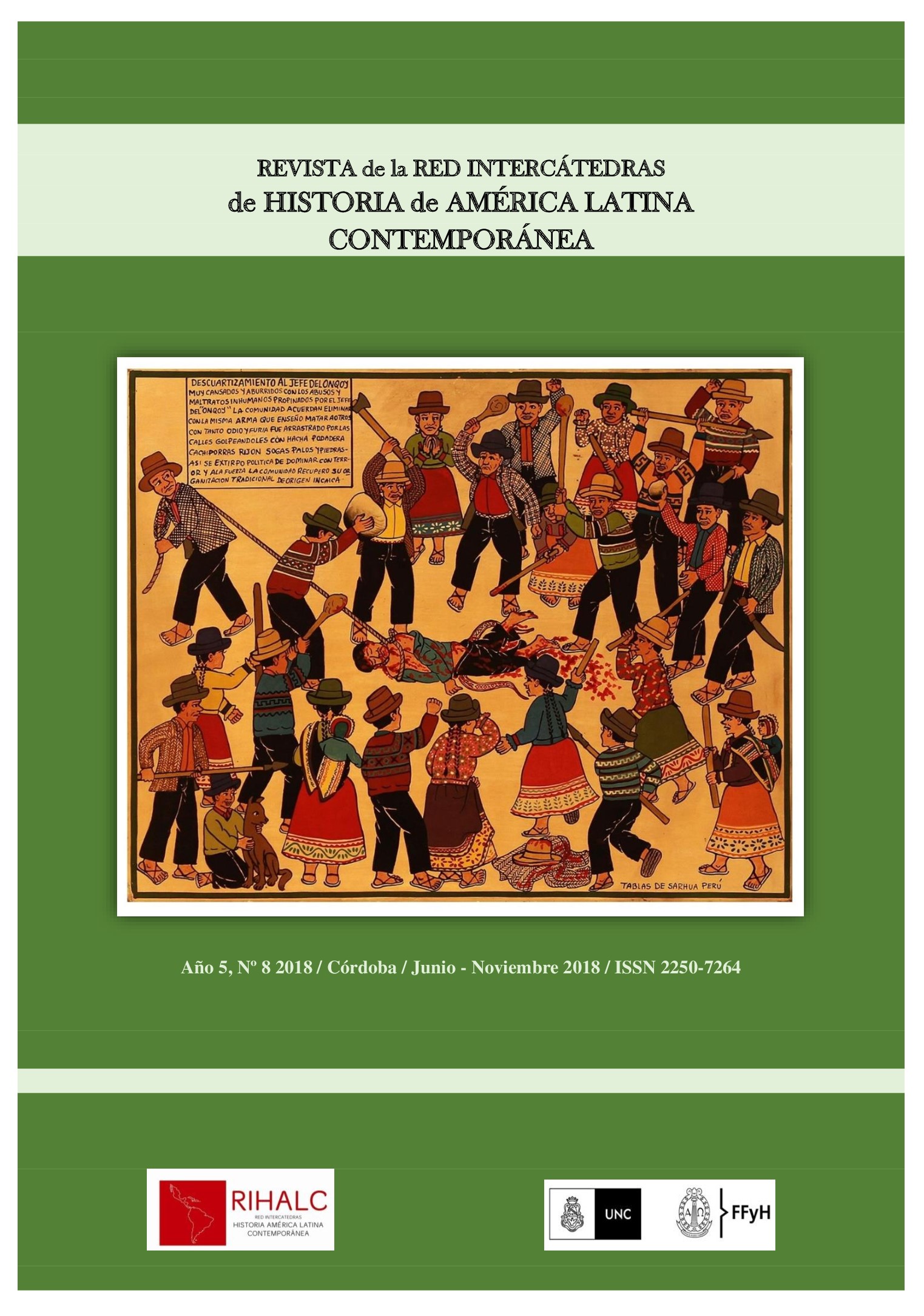The positions of Argentina around the negotiations for the FTAA during the government of Eduardo Duhalde, 2002
Keywords:
FTAA, Argentina, Brasil, Eduardo Duhalde, Fernando Henrique CardosoAbstract
I propose to describe the positions of the Argentine government regarding the negotiations for the FTAA during the year 2002. I observe the different attempts promoted by the presidents Eduardo Duhalde (Argentina) and Fernando Henrique Cardoso (Brazil) to reach a unity between the MERCOSUR and the CAN and thus constitute a monobloc that, from their point of view, would have allowed obtaining better returns from the FTAA agreement. The exhibition is strictly chronological and descriptive, although I make some interpretations of the events that occurred during: a) the Second Summit of Presidents of South America held in July 2002 in the city of Guayaquil and b) the positions and resolutions adopted at the VII Meeting Ministerial of the FTAA, held in November 2002 in Quito, where an attempt was made to effect a common position among the various countries of South America. I show that these two moments were founding of what I call the politicization of the negotiations, because MERCOSUR and the United States tried to form alliances to strengthen their positions. The underlying hypothesis is that the positions of the Argentine government aimed to achieve a better position in the negotiations for the FTAA, and for this it sought the support of Brazil and the rest of the countries of South America. The purpose of this positioning was to reach agreements that resulted in favorable commercial balances that help to recover the economy and, at the same time, allow responding to diverse social demands. From the point of view of Argentina, this position was based on the social insurrection of December 2001 that led to the end of convertibility and changes in the form of the state, which tended to respond to social demands that emerged during the struggles against neoliberal capitalism. Responding to these demands was a condition of possibility for the recomposition of political power and the conditions of accumulation after that social insurrection.Downloads
References
Raúl Bernal-Meza (2002): “La Crisis Argentina: Su Impacto en las Relaciones Bilaterales argentino-brasileñas y sobre el MERCOSUR”.
http://www.revistas.usp.br/prolam/article/view/83042/86087. Re visión, 28/06/15.
Berringer, Tatiana (2015): A burguesia brasileira e a política externa nos governos FHC e Lula. Appris. Curitiba.
Bidaseca, Karina y Rossi, Federico (2008): “Coaliciones nacionales contra procesos continentales de liberalización comercial: la Autoconvocatoria No al ALCA”. En: Grimson, Alejandro (com.) Conflictos globales, voces locales. Movilización y activismo en clave transnacional. Prometeo. Buenos Aires.
Bonnet, Alberto (2015): El kirchnerismo. La insurrección como restauración. Prometeo. Buenos Aires.
Duhalde, Eduardo (2006): Comunidad Sudamericana. Logros y desafíos de la integración. Planeta, Buenos Aires.
Estay, Jaime (2005): “América Latina en las negociaciones comerciales multilaterales y hemisféricas”. En: Estay, Jaime (comp.) La economía mundial y América Latina: tendencias, problemas y desafíos. CLACSO. Buenos Aires.
Estay, Jaime (2004): “El ALCA después de Miami: la conquista continua”. En Ceceña, Ana y (comp.) Hegemonías y emancipaciones en el siglo XXI. CLACSO. Buenos Aires.
Estay, Jaime y Sánchez, German (2005): “Una revisión general del ALCA y sus implicaciones”. En: Estay, Jaime y Sánchez, German (coordinadores) El ALCA y sus peligros para América Latina. CLACSO. Buenos Aires.
Kan, Julián y Pascual, Rodrigo (2011): “Integración regional en América Latina y Argentina: ¿Solamente una cuestión de Estaos?”. En: Bonnet, Alberto (comp.) El país invisible. Debates sobre la Argentina reciente. Peña Lillo- Continente. Buenos Aires.
Kan, Julián (2015): La integración desde arriba Los empresarios argentinos frente al MERCOSUR y el ALCA. Ciccus-Imago Mundi. Buenos Aires.
Kan, Julián (2009): “Crisis económica, burguesía industrial argentina e integración con Brasil. Una tríada clave en la historia reciente del MERCOSUR”. www.sep.org.br/artigo/1887_a57a805bffeda6e94284b1180383f5de.pdf-
Pascual, Rodrigo (2016): La Argentina y el ALCA: de la adhesión incondicional a la oposición abierta. Un análisis desde la perspectiva del marxismo abierto. Tesis doctoral. Facultad de Ciencias Sociales. Universidad de Buenos Aires. Defendida 11/3/2016. https://www.academia.edu/25870863/LA_ARGENTINA_Y_EL_ALCA.
Pascual, Rodrigo y Kan, Julián (2011): “La política exterior argentina post 19 y 20 de diciembre. La autoconvocatoria No al ALCA y las negociaciones gubernamentales por el ALCA. Herramienta, N° 46.
Pascual, Rodrigo (2009): “Elementos parciales para una perspectiva crítica de las luchas conrta el libre comercio: una aproximación a la Autoconovocatoria No al ALCA”. En: Senén Gonzalez, Cecilia y Schettini, Patricia (coord.) Trabajo y relaciones laborales en Argentina: sector formal e informal. Prometeo-UNLM. Buenos Aires.
Pascual, Rodrigo; Ghiotto, Luciana: Lecumberri, David (2007): El libre comercio en lucha: una mirada crítica del ALCA. Ediciones CCC. Buenos Aires.
Piva, Adrián (2015): Economía y política en la Argentina kirchnerista. Batalla de Ideas. Buenos Aires.
Redrado, Martín (2003): Exportar para crecer. Planeta. Buenos Aires.
Rossi, Federico (2006): “La disputa por el espacio en la Cumbre de los Pueblos: la importancia simbólica de la geografía en la definición de los conflictos políticos”. En: Conflictos globales, voces locales, N° 2.
Svampa, Maristella (2008): Cambio de época. (Siglo XXI: Buenos Aires).
Tussie, Diana y Botto, Mercedes (2003): El ALCA y las cumbres de las Américas: ¿una nueva relación público-privada? Biblos: Buenos Aires.
Diarios
Clarín (Argentina). Enero 2002 – Febrero 2003.
La Nación (Argentina). Enero 2002 – Febrero 2003.
Página/12 (Argentina). Enero 2002 – Febrero 2003.
Entrevistas
Entrevista realizada a Eduardo Sigal, Buenos Aires, Argentina, 10 de noviembre de 2011.
Entrevista realizada a Rafael Bielsa, Buenos Aires, Argentina, 10 de noviembre de 2011.
Downloads
Published
How to Cite
Issue
Section
License
Aquellos autores/as que tengan publicaciones con esta revista, aceptan los términos siguientes:
- Los autores/as conservarán sus derechos de autor y garantizarán a la revista el derecho de primera publicación de su obra, el cuál estará simultáneamente sujeto a la Licencia de reconocimiento de Creative Commons que permite la libre distribución con mención de su(s) creadores, no permite el uso comercial ni las obras derivadas. Los autores, al enviar el artículo, acuerdan publicarlo bajo esta licencia..
- Los autores/as podrán adoptar otros acuerdos de licencia no exclusiva de distribución de la versión de la obra publicada (p. ej.: depositarla en un archivo telemático institucional o publicarla en un volumen monográfico) siempre que se indique la publicación inicial en esta revista.
- Se permite y recomienda a los autores/as difundir su obra a través de Internet (p. ej.: en archivos telemáticos institucionales o en su página web) después del proceso de publicación.



